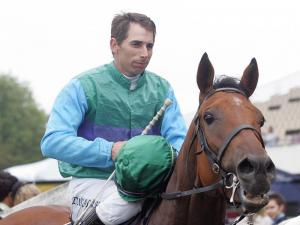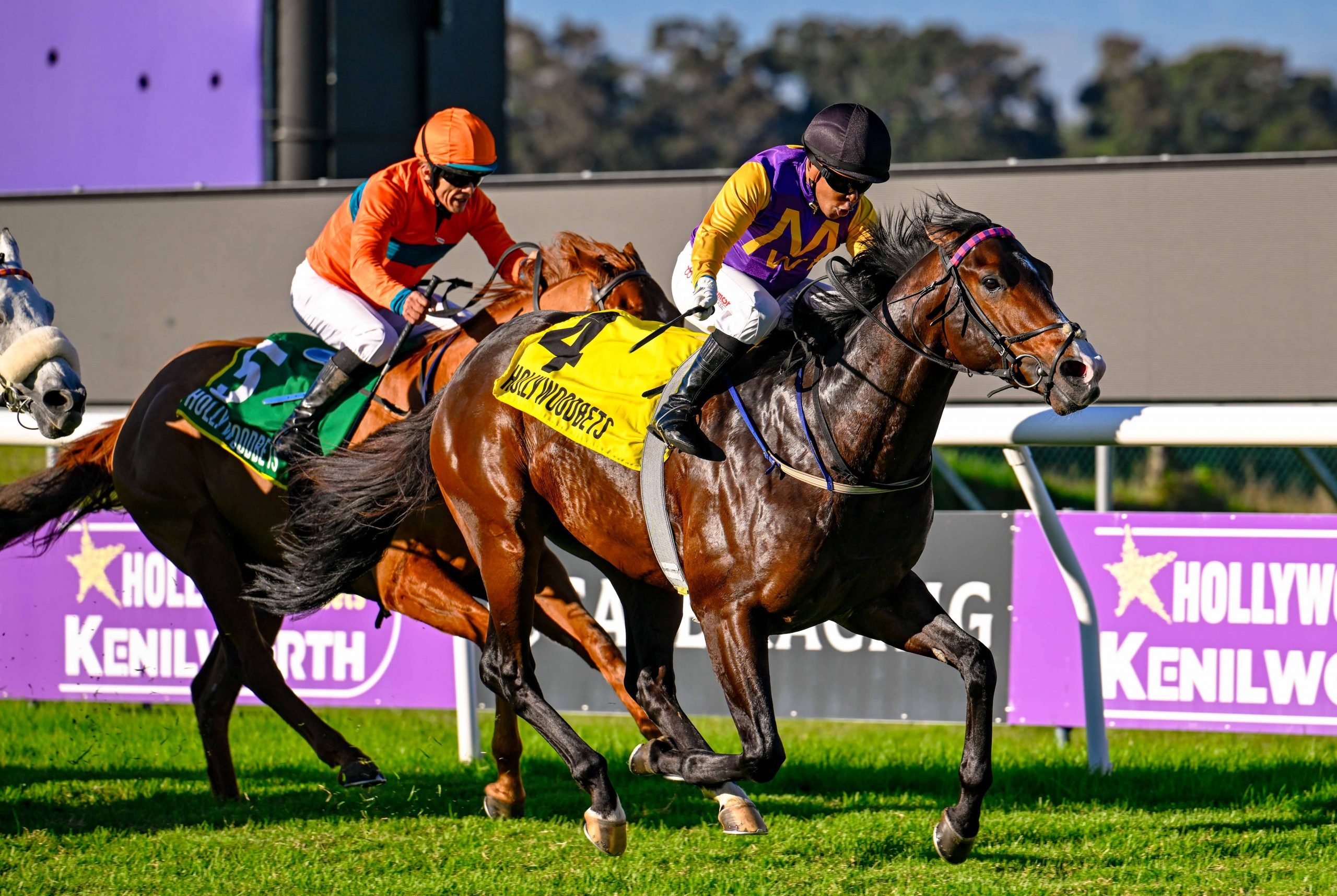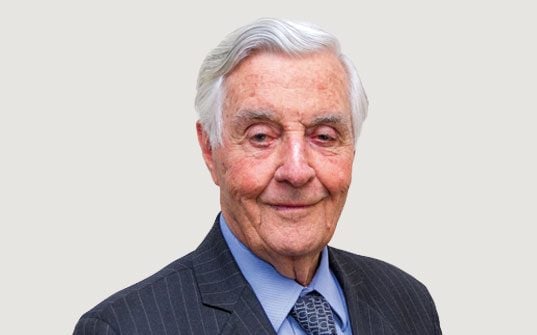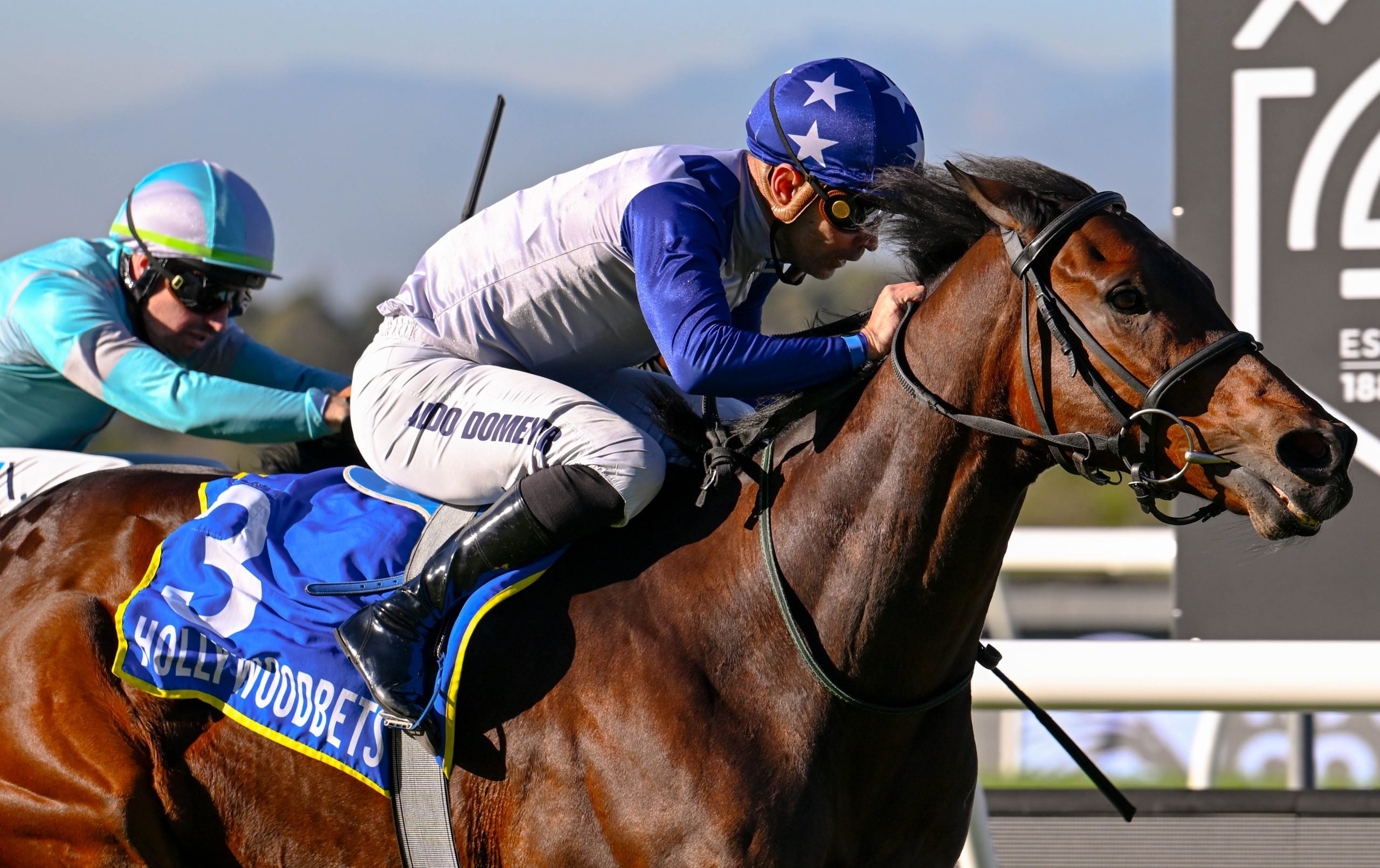It was always going to end badly. From the moment David Walker got out of his car at Trentham racecourse carrying a bundle of files instead of his saddle, his career as a jockey was over.
Walker wasn’t armed for this kind of fight. For a relative loner who didn’t talk much, even in the jockeys’ room, he was hopelessly adrift in racing’s courtroom where legal eloquence rules.
With his original counsel gone, and ineligible for legal aid, Walker had only his wife Vicky and father Jim to support him.
For someone used to kicking his heels into the flanks of a half tonne racehorse, he was a longshot to ever be able to nagivate his way through the reams of paperwork and sea of yellow sticky notes in front of him.
And the further he went into what would prove to be his last race, the longer the pauses became, the more his poorly framed arguments trailed off into silence, and the more frustrated his adjudicators became.
So why, everyone watching this utimate no contest was thinking, would someone whose entire career was on the line risk piloting this Titanic himself when he wasn’t even equipped to sail a dinghy?
The answer to that question, and the likely reason behind the entire sorry episode, is probably answered in the notes of the very first interview between Racing Integrity Unit investigators and Walker after they discovered his trail of betting.
“I am under so much financial pressure, I am embarrassed at not being able to provide for my family,” Walker told RIU integrity assurance manager Neil Grimstone.
Walker later reneges on much of what he said at that first encounter, arguing he was “lured” to the Marton motel room, where he was “intimidated and bullied”. He maintains he signed an incorrect version of events “just so he could get out of there.”
But he never denies his money troubles. That’s why his lawyer isn’t here today – he can’t afford to pay her.
And then he reveals he lied to his wife about how he won money that day at Waverley on July 31.
While Walker actually bet $510 against his own mount, Lil Mer, in a head-to-head bet, Vicky didn’t know what was going on.
Told her he backed a roughie he rode, Be The Most, which paid $7 for a place. Gave her the $900 to put into their account to pay for his petrol.
We can only surmise why Walker felt he had to lie to his wife – was he feeling guilty about betting against his own mount, the most serious offence in racing, or trying to hide risking so much of the family’s money?
While there’s no evidence Walker had a history of heavy betting on horses, RIU investigators believe pokies were his thing – he won $1100 on them in the Captain Cook bar in Marton the same night he collected from his head-to-head bet.
But his fortunes were mixed – he missed out on collecting thousands when he put $120 on a random dog, then cancelled the bet, so he could cash in his winning head-to-head ticket. The dog won and paid $28.
“I am not a gambling addict, I don’t gamble with my family and I don’t gamble with my career,” he tells the tribunal.
Yet in the course of the hearing it emerges he used a self service machine at the Club Hotel in Marton to bet $640 on Watch Your Man’s head-to-head rival St Ransom at odds of $1.80, standing to make a profit of just $512.
In the end maybe Walker decided he couldn’t rely on the spin of the pokie wheel any longer. He preferred something he could control – his own mount.
THE VIDEO – WATCH YOUR Man, Awapuni, August 16.
Stipendiary steward Matthew Williamson has done his homework.
He has film of every conceiveable angle of Walker’s ride on Watch Your Man, and tracks, step by step, the progress of the horse, relative to the one Walker actually backed, St Ransom, in his $640 head-to-head bet.
It is compelling viewing.
See how Walker’s feet are forward at the start, Williamson says, body leaning back, and the horse is reacting to being restrained and racing ungenerously.
And there, despite Walker saying he didn’t want to be on the inside where the ground is chopped up, he stays adjacent to the running rail when he could have moved out wider. He’s getting no interference from other runners.
Rather than struggling and hanging, as Walker makes out, Watch Your Man is actually travelling really well, and is so full of running he improves on to the heels of St Ransom and loses two lengths when Walker checks him.
Williamson points out that when struck twice with the whip, Watch Your Man actually responds immediately, making ground.
But Walker is not riding forward with his hands, not allowing the horse the chance to run.
And watch there, as he lets the horse drift across the heels of St Ransom and grabs hold again.
Walker hits his horse three times between the 400m and 200m but otherwise shows no urgency. The horse is actually going so well Walker takes another hold, there, and continues that way to the line. That’s not just a lack of vigour, he says. That’s restraint.
THE EXPLANATION
He’s a difficult horse to ride, argues Walker. He hangs, throws his head and over-races.
You only have to look at the judicial reports to see that.
“I was giving him a better chance of winning by keeping him under a hold,” he argues.
Check out this video, Walker says, as he shows how the horse runs out of gas a long way from home when allowed to charge forward early.
Walker calls fellow rider Shannon Doyle to corroborate his evidence that Watch Your Man is badly behaved.
But while Doyle confirms Watch Your Man was “pretty much out of control” the first time he rode him, field shy, very erratic and inclined to hang and throw his head about, he dampens Walker’s case by admitting, on cross examination, that the horse’s manners improved the second and third time he rode him.
Still, Walker gets an admission from Doyle that if the horse is ridden back, it’s a 50-50 chance he will misbehave.
Walker, however, looks a little like a goldfish gasping for air when RIU co-chief stipendiary steward Ross Neal asks why, then, did he deliberately ride the horse in behind and put it in a position where it would be vulnerable to showing those traits.
Because that’s the best way to ride the horse, Walker says as he regathers himself. Just because he’s arrogant, like a naughty child, doesn’t mean you should pander to the horse.
Watch Your Man might have looked like he was travelling on the film, Walker says, but he was actually doing it all wrong again.
Walker says when he hit Watch Your Man three times at the 300m and he started hanging he had to put his whip away and straighten him.
But it’s his story about the last 250 metres of the race that is at the crux of the matter.
THE CRAMP
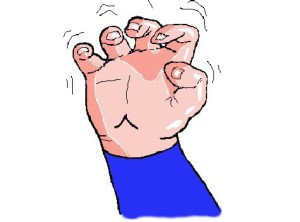 At the 250m I tried to use the whip again but I couldn’t, Walker says. “My hand had cramped up and was firmly stuck on the rein. I was frozen in the position for the rest of the race. I was in a lot of pain when I pulled up. I had to use my left hand to release my right hand off the rein.”
At the 250m I tried to use the whip again but I couldn’t, Walker says. “My hand had cramped up and was firmly stuck on the rein. I was frozen in the position for the rest of the race. I was in a lot of pain when I pulled up. I had to use my left hand to release my right hand off the rein.”
The RIU is not impressed.
How many times have you had cramp like this before, asks Neal.
A few times, not that often, Walker replies.
I’ve had it in the barriers before I jump out, or after I come back to scale or unsaddling or in the jockeys’ room, but never in a race like that before.
You would have to be the most unlucky rider in the world to be beset with cramp when you’ve also backed a horse, Neal says.
So was it in your hand or your arm?, Neal quizzes. On the day you said you cramped up on the outside of your hand. Later you told us it was in your whole arm. Which was it?
I never said it was my arm, Walker hits back.
I only ever get cramp in my right hand and only on racedays when I’m dehydrated.
Walker says he wasted in the sauna the night before Awapuni and on the morning of the races as well.
After a vigorous ride in the opening race, he wasn’t able to rehydrate straight away because Watch Your Man was his lightest ride of the day.
But after riding Watch Your Man he drank at least a litre of water and had a coffee, so was not affected in the next race which he won on stablemate Danny Boy.
Walker’s attempt to prove the cramp through a Monday visit to his doctor and an affidavit on all the previous injuries he’s had to his right hand and thumb have little impact on Judicial Control Authority committee chairman Murray McKechnie.
McKechnie says he can’t give the affidavit too much weight given the doctor is not present to be questioned. There’s no corroborative independent evidence that Walker has a medical condition that would explain cramp in his hand or arm.
So, too, another affidavit from co-worker Tracey Kenny which attests Walker had his hand strapped while riding trackwork every day for two months from March after a riding accident.
Williamson shows Walker’s other rides on the day, where in his typical “old school vigorous style” he strikes his mounts up to 19 times in the last 400 metres.
Williamson points out there’s no evidence in the films that the rider is in any discomfort after Watch Your Man’s race, his style of easing down his mounts similar in each case.
THE VERDICT
 The burden of proof which must be satisfied in racing inquiries is the civil standard – on the balance of probabilities – says McKechnie, not the criminal standard which is proof beyond a reasonable doubt.
The burden of proof which must be satisfied in racing inquiries is the civil standard – on the balance of probabilities – says McKechnie, not the criminal standard which is proof beyond a reasonable doubt.
But while the civil standard is appropriate the more serious the allegation, the more compelling the evidence is required to be.
Here the charges are very serious . . .
It is the committee’s view, McKechnie continues, that Walker intentionally and deliberately restrained Watch Your Man early and failed to give the horse adequate opportunity to take up a more favourable position in the middle stages.
Walker said he got cramp in his hand in the last 250 metres but it is the committee’s view he could, and should have, done more in the straight and he deliberately chose not to do so.
If cramp in fact happened he was already riding the horse deliberately to make sure it finished behind the other one.
Walker said he had never previously suffered cramp in a race, and in the next race he was able to ride his horse with vigour, and it went from last to first.
His actions were deliberately designed to ensure the horse he had bet on finished ahead of the horse he was riding.
THE PENALTY
Walker doesn’t front for sentencing the next morning.
And his flimsy submission pointing to a six-week suspension jockey Shankar Muniandy was given for betting on another horse in 2012 is of no relevance.
But McKechnie and his offsider Noel McCutcheon have had all night to mull over the 10 pages of penalty submissions from the RIU.
Stopping a horse from winning is the worst crime a jockey can commit, submits Neal. The RIU wants Walker banned for 10 years on the riding charge, the same penalty handed out to British rider Eddie Ahern in 2013.
The committee settles on seven – with another year for the two betting charges, to be served concurrently. Walker is also ordered to pay costs of $3000.
There have been few examples in recent times of conduct as “objectionable and corrupt” as that of Walker, McKechnie says.
His actions were thought out and calculated and Walker had let down a wide range of people, including owner-trainer Eddie Carson, who had supported him over the years with many winners.
There are a number of aggravating factors, says McKechnie, but little that can be offered in mitigation.
THE FUTURE
While it’s a sad day for racing, both RIU general manager Mike Godber and NZTR chief executive Greg Purcell are pleased with the result.
“Mr Walker’s actions threatened the very fabric of New Zealand racing and the strong penalty applied by the JCA panel sends a signal that the industry holds the integrity of racing at the highest priority,” Godber says.
“The message is clear, serious breaches such as this case will have severe consequences for those involved.”
The case, says Godber, illustrates the effectiveness of the RIU’s systems of surveillance and its investigation processes.
Purcell, too, gives a tick to the rapid and effective way the case has been handled.
But he is still looking for change, and not just to the rules on jockeys betting, which he hopes will be further tightened by the end of the year into a blanket ban.
While NZTR has failed to convince the New Zealand Racing Board to remove head-to-head wagering immediately, a review of the controversial bet type is underway.
A working party, including the RIU, met on Friday to thrash out the terms of reference and it is hoped their report will be finalised in three weeks.
“They will be considering integrity, animal welfare and commercial issues,” Purcell said.
THE WORRY
 Ok, so the officials caught Walker. The system works, they say. Job well done.
Ok, so the officials caught Walker. The system works, they say. Job well done.
But aren’t we left asking why a seemingly successful rider, with more than 20 years in the saddle, got himself into this position in the first place?
Walker was a journeyman but he was no battler. He’d ridden 872 winners over 23 years, his mounts earning more than $10 million.
With 40 winners last season, wasn’t he earning enough to look after his wife and two daughters?
The raw numbers will tell you his minimum before tax earnings amounted to about $87,500 – $33,000 from his winning percentages and $54,500 from his riding fees (436 rides at $125 a time).
If Walker, paying off his mortage, can’t make it on that, what chance all the other jockeys?
– Sunday Star Times


